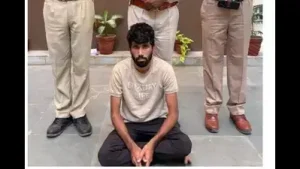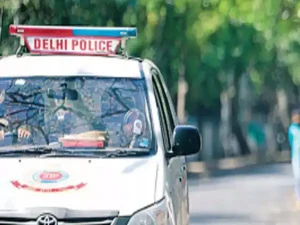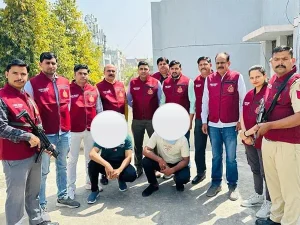New Delhi – Delhi Police have successfully dismantled an extensive international vehicle theft racket operating across multiple states in India and controlled from Dubai. The operation led to the arrest of eight individuals involved in stealing, reprogramming, transporting, and selling high-end vehicles throughout the country. This international vehicle theft racket had been operating with sophisticated methods and a well-organized network structure.
Dubai-Based Mastermind Behind International Vehicle Theft Racket
The investigation into this international vehicle theft racket began last August when Delhi Police arrested 40-year-old Taj Mohammad, a criminal with over 70 cases registered against him. Initially, authorities believed Taj Mohammad was the mastermind behind the vehicle theft operation. However, during interrogation, they discovered that the actual leader was Amit Pasha, a Dubai-based controller who orchestrated the entire operation remotely.
“What we learned was that the brains behind the operation was not Taj Mohammad, but a Dubai-based controller, Amit Pasha,” said a senior police official involved in the investigation. The Delhi Police have issued a Look-Out Circular (LOC) against Pasha, who remains at large outside Indian jurisdiction.
Also Read: Court Allows NIA to Collect Voice Samples of Tahawwur Rana: Breakthrough in 26/11 Investigation
This international vehicle theft racket operated through a sophisticated network, with each member assigned specific roles ranging from vehicle theft to technical modifications, transportation, financing, and sales in different parts of the country.
Technical Expert Who “Decoded” Vehicles

The first significant arrest in dismantling this international vehicle theft racket came with the apprehension of 25-year-old Imran Khan, also known as Guddu, a resident of Seelampur in Delhi. Imran played a crucial technical role in the operation as an expert in bypassing Engine Control Module (ECM) codes of high-end vehicles.
“Imran played a critical role in enabling the syndicate’s seamless theft operations,” explained DCP (Crime) Apoorva Gupta. His technical expertise allowed the gang to override the security systems of targeted vehicles, making them operational without the original keys and erasing their digital identities.
In the international vehicle theft racket, Imran’s skills were fundamental to the operation’s success. He could reprogram vehicle security systems, change digital identifiers, and effectively make stolen vehicles untraceable through conventional methods. This technical know-how was essential for the gang to handle modern vehicles equipped with sophisticated anti-theft technologies.
Supply Chain of the International Vehicle Theft Racket
After Imran would “decode” the stolen vehicles, they would enter a sophisticated supply chain within the international vehicle theft racket. The next key player was Mateen Khan, a resident of Uttar Pradesh, who served as the middle man between the technical team and the sellers across India.
Mateen Khan’s role in the international vehicle theft racket involved receiving the reprogrammed stolen vehicles and distributing them to various “sellers” operating in multiple cities. “He supplied these cars to sellers such as Kunal Jaiswal and others in cities like Vadodara, Hyderabad, and Mumbai,” said DCP Gupta.
The investigation revealed that Kunal Jaiswal, a 24-year-old from Mumbai, was a major receiver in this international vehicle theft racket. He specialized in reselling the stolen vehicles in western India. “Kunal facilitated the resale of stolen cars in major cities such as Mumbai, Pune, and Nasik. Kunal admitted to purchasing multiple stolen vehicles from Mateen,” Gupta added.
Transportation Network
The international vehicle theft racket employed a dedicated team of transporters to move the stolen vehicles across state lines. Three arrested individuals – Nagender Singh (46), Manish Arya (48), and Nadeem (38) – were responsible for transporting the stolen vehicles from Mateen Khan to various regional buyers throughout India.
These transporters were critical in ensuring the safe passage of stolen vehicles across state boundaries, avoiding police checkpoints, and maintaining the secrecy of the operation. Their knowledge of routes, checkpoints, and transport logistics made them valuable assets to the international vehicle theft racket.
Financial Operations and Northeast India Connection
Every successful criminal enterprise requires reliable financing, and this international vehicle theft racket was no exception. The police identified 40-year-old Akbar as the key financier who received funds directly from Dubai-based Amit Pasha to sustain the operation within India.
“He coordinated the delivery of stolen vehicles to buyers in Northeast India and West Bengal on instructions from Amir Pasha,” explained DCP Gupta. Akbar’s role extended beyond mere financing – he also served as a distributor with established connections to buyers in Northeast India, a region where the demand for discounted luxury vehicles has reportedly increased in recent years.
The northeast connection represents an important dimension of this international vehicle theft racket, highlighting how stolen vehicles from metropolitan areas were channeled to remote regions where verification systems might be less stringent, and questions about vehicle provenance less common.
Breakthrough Crime Branch Operation


On February 26, the Crime Branch conducted a coordinated operation that resulted in the arrest of seven members of Pasha’s car theft gang, effectively crippling the core infrastructure of this international vehicle theft racket in India.
The seven arrested individuals included car sellers, technicians, transporters, and the financier – essentially dismantling every operational layer of the criminal network except for its foreign leadership. This synchronized action followed months of surveillance and intelligence gathering by the Delhi Police after their initial breakthrough with Taj Mohammad’s arrest.
“The arrest of these seven individuals has dealt a significant blow to the operations of this international vehicle theft racket in north India,” a senior police officer confirmed. “We’ve effectively disrupted their supply chain, technical support, and distribution network.”
Sophisticated Methods and Wide Reach
What makes this international vehicle theft racket particularly notable is the sophisticated methods employed and its extensive geographic reach. Unlike conventional vehicle theft operations that focus on immediate local resale, this syndicate had established an interstate network with connections to international controllers.
The gang specifically targeted high-end vehicles with strong resale value in the secondary market. After theft, these vehicles would undergo technical modifications to bypass security systems, receive new identification markers, and be transported to cities hundreds of kilometers away for resale.
This international vehicle theft racket operated across multiple states including Delhi, Uttar Pradesh, Maharashtra, Gujarat, Telangana, and had established channels reaching into Northeast India and West Bengal. The coordination between different members across these vast distances demonstrates the sophisticated nature of this criminal enterprise.
Ongoing Investigation


While the Delhi Police have successfully apprehended eight members of this international vehicle theft racket, the investigation remains ongoing. Authorities are working to trace additional gang members who might still be operating in different parts of the country.
“We are also coordinating with international agencies regarding the apprehension of Amit Pasha,” confirmed a senior police official. The issuance of a Look-Out Circular represents the first step in what might become an international effort to bring the Dubai-based mastermind to justice.
Police are also working to recover additional stolen vehicles that might have been distributed through this network but have not yet been traced. Owners of recovered vehicles are being contacted as the vehicles are identified.
Closing Remarks
The successful operation against this international vehicle theft racket represents a significant achievement for Delhi Police in combating organized vehicle theft operations. By dismantling multiple layers of this sophisticated criminal network, authorities have disrupted a major interstate crime syndicate.
As investigations continue, this case highlights the evolving nature of vehicle theft in India, with criminals adopting increasingly sophisticated methods and establishing international connections to evade law enforcement. The operation also underscores the importance of interstate and international cooperation in addressing such complex criminal networks.
The Delhi Police have urged citizens to report suspicious vehicle sales and to always verify proper documentation when purchasing second-hand vehicles, as these steps can help prevent the inadvertent purchase of stolen vehicles and disrupt the market for international vehicle theft rackets.

